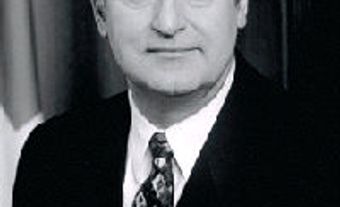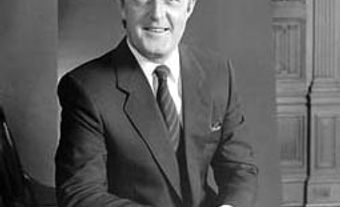A Québec free to choose: report of the Constitutional Committee of the Québec Liberal Party (better known as the Allaire Report) was a party policy adopted in March 1991, then removed in August 1992. This policy proposed a vast decentralization of federal powers and significant autonomy for the Quebec state. Several aspects of this program, which could be characterized as “autonomist,” were reclaimed by the Action démocratique du Québec party, then by the Coalition Avenir Québec party.
Origins
In February 1990, while the Meech Lake Accord entered the final round for ratification, the Quebec Liberal Party (QLP) reaffirmed its support and formed an internal constitutional committee chaired by Jean Allaire, a 60 year-old lawyer and dedicated liberal. This committee was responsible for formulating a constitutional position for negotiations which would follow the accord’s implementation that summer.
However, the Meech Lake Accord did not make ratification by all provincial legislatures by the 23 June 1990 deadline, and the events that followed were beyond Jean Allaire’s mandate. Premier Robert Bourassa and Jacques Parizeau, leader of the opposition, agreed to form the Bélanger-Campeau Commission. The Commission and Allaire’s committee would work in parallel with similar, yet distinct, mandates.
Recommendations
Little was known about the internal workings of Jean Allaire’s committee, except that it was kept informed of the Bélanger-Campeau Commission hearings in the fall of 1990 and that it drew inspiration from them to write the report. A Québec free to choose: report of the Constitutional Committee of the Québec Liberal Party was tabled on 28 January 1991. The report called on the government to recover legislative responsibilities from the federal state in 22 areas. This recommendation by far surpassed that of the Meech Lake Accord, which called only for immigration matters to be handed to the Quebec government. Thus, the Allaire Report recommended a significant decentralization of the federal government’s powers, in favour of a more independent Quebec state. Except for nine areas in which it would have shared powers, the federal government would only retain control of matters of defence, tariffs, currency, fiscal equalization, and federal debt management. The powers in the remaining areas would go to the province of Quebec. The Allaire Report also proposed abolishing the Senate of Canada and adopting a formula for constitutional amendment requiring the approval of 50% of the Canadian population, including that of Quebec.
The report also proposed a bilateral negotiation approach between the government of Quebec and that of Canada. The latter would be invited to sign a constitutional agreement which would satisfy Quebec by Fall 1992; otherwise, the liberal government would hold a referendum on sovereignty. The recommendations were very similar to that of the Bélanger-Campeau Commission, which were released publicly on 27 March 1991.
Reception
The Allaire Report was received and debated at the Quebec Liberal Party’s congress on 9 March 1991, two weeks before the Commission Bélanger-Campeau’s report was tabled.
It pleased the nationalist wing of the QLP, but others wished for a more flexible position. Among the latter was Claude Ryan, minister of municipal affairs and public security, who was outraged by the report’s recommendation and slammed the door on the congress. Premier Robert Bourassa also managed expectations by making a speech in favour of federalism, saying that “we are proposing a decentralized Canada, but with a central government which would have very significant powers.” At this stage, the premier was more preoccupied by the “rapidly ageing francophone population” and by the “cultural security” of the Quebecois population, than by the constitutional choice they would make. However, he still hoped that the decentralization of federalism would give the province the necessary powers to ensure the “development of the Quebec identity.” He believed that this approach would be more promising — or less risky — than sovereignty.
Despite these interventions, the report was adopted by most of the 2,700 activists present, with minor amendments.
Influence
The QLP was forced to set aside the Allaire Report because of the accord to amend the Canadian Constitution, signed by the premiers at the Charlottetown Conference in August 1992. (See also Charlottetown Accord.)
Feeling betrayed by the rejection of his report, Jean Allaire joined forces with Mario Dumont, president of the QLP’s youth commission. Convinced that the QLP’s allegiance to Ottawa had become too strong, these two members of the nationalist wing tore up their party membership card. They launched a campaign against the Charlottetown Accord, which would be presented for a vote by the Canadian population on 26 October 1992. The Réseau des libéraux pour le Non managed to convince a small majority of Québécois to reject the proposition.
In November 1993, Jean Allaire and Mario Dumont severed ties with the QLP because they felt that the province was “running idle”. In December 1993, Allaire and Dumont decided to form a new political party: the Action démocratique du Québec (ADQ). In March 1994, Jean Allaire was elected leader of the new party. However, a month later he withdrew for medical reasons and was succeeded by Mario Dumont. According to Dumont, the party sought to release Quebec from the “old debate, […] between separation and federalism.” The ADQ continued to gain popularity — from 6.5% at the polls in 1994 to 31% in 2007 — but lost some momentum afterwards. At the time of ADQ’s merge with Coalition Avenir Quebec (CAQ) in 2012, several aspects of provincial autonomy, as proposed in the Report, were the foundation of the new party’s constitutional position. CAQ won the 2018 elections and now forms a government where it applies this autonomist approach.

 Share on Facebook
Share on Facebook Share on X
Share on X Share by Email
Share by Email Share on Google Classroom
Share on Google Classroom


